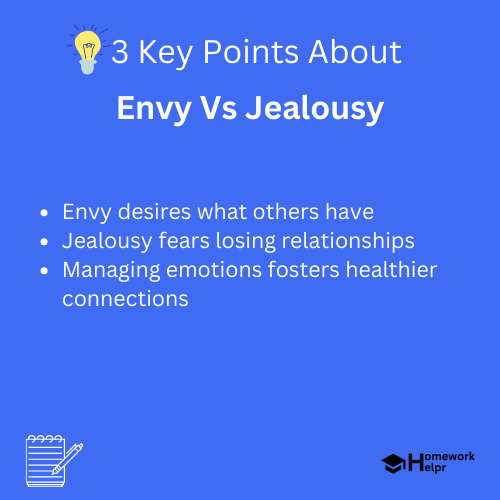📝 Summary
Envy and jealousy are often confused, yet they represent different emotional reactions. Envy is the desire for something someone else possesses, leading to feelings of inadequacy. In contrast, jealousy involves a fear of losing a valued relationship to a third party. Both emotions can have strong impacts on mental health and relationships, serving as triggers for resentment or insecurity. Understanding these differences is crucial for emotional intelligence and enables individuals to navigate these feelings through open communication and personal growth strategies.
Understanding Envy and Jealousy
Envy and jealousy are two emotions that often get confused with one another. Despite their similarities, they represent different feelings and reactions we experience in our daily lives. This article will help you understand the differences between these two emotions, including their definitions, causes, and impacts on relationships.
What is Envy?
Envy is an emotional response that occurs when we desire something that another person possesses. This could be anything from physical attributes to a successful career or even a happy relationship. The feeling of envy often arises from a comparison of our own circumstances with someone else’s. When we perceive that others have something we covet, it triggers feelings of inadequacy and discontent.
Definition
Envy: A feeling of discontent or covetousness with regard to another‚’ advantages or success.
For instance, if you see a classmate showing off their new smartphone while you are using an older model, you might feel envious. That desire to have what your classmate has reflects envy. It is essential to note that envy does not necessarily manifest as a wish for harm to the other person; rather, it is more about longing for what they have.
Examples
1. You might feel envious of a friend who has a beautiful singing voice that you wish you possessed. 2. A child may envy a sibling who has better grades despite working hard themselves.
What is Jealousy?
Unlike envy, jealousy is a complex mix of emotions that arises in situations involving perceived threats to a relationship. Jealousy is commonly associated with romantic relationships, but it can also occur in friendships or family dynamics. The core of jealousy revolves around the fear of losing something we value to someone else.
Definition
Jealousy: A complex emotional reaction to the perception that a valued relationship is under threat from a third party.
For example, if your partner spends time with a new friend, you may feel jealous because you fear losing their attention or affection. This emotion can provoke feelings of insecurity and anxiety and sometimes results in conflict if not managed properly.
Examples
1. A student may feel jealous if they see their best friend hanging out with another group of friends instead of them. 2. Siblings might experience jealousy if one child receives more attention from their parents during family gatherings.
Key Differences Between Envy and Jealousy
Understanding the differences between envy and jealousy can help individuals navigate their emotions more effectively. Here are some key distinctions:
- Focus: Envy focuses on wanting what someone else has; jealousy is concerned with fear of loss.
- Relationships: Envy can arise without a direct relationship with others; jealousy is rooted in existing relationships.
- Emotions: Envy can lead to feelings of resentment; jealousy often includes feelings of insecurity.
To further illustrate, consider a scenario where you admire a friend‚’ fashion sense (envy) versus feeling threatened when that friend is complimented by someone else in your presence (jealousy). While both feelings arise from comparison, their triggers and underlying emotions differ.
The Psychological Impact
Both envy and jealousy can have considerable impacts on our mental and emotional health. They can lead to feelings of inadequacy, resentment, and sometimes even hostility towards others. However, envy can also serve as a motivation to improve oneself or achieve personal goals, while jealousy can drive communication issues and arguments in relationships.
❓Did You Know?
Did you know that studies suggest a small amount of envy can actually boost performance? It might inspire competitive drive!
Positive and Negative Outcomes
It‚’ crucial to understand that both emotions can have positive and negative outcomes. Here‚’ how:
- Positive Outcomes:
- Envy can inspire you to improve your own skills and accomplishments.
- Jealousy can motivate individuals to affirm their commitment in a relationship.
- Negative Outcomes:
- Envy can lead to toxicity in friendships if not addressed healthily.
- Jealousy often creates conflict, leading to mistrust and separation in relationships.
Managing Envy and Jealousy
Properly managing these emotions is essential for maintaining healthy relationships. Here are some tips to navigate feelings of envy and jealousy:
- Communicate: Talk openly with your friends or partners about your feelings. Sometimes, sharing your worries can alleviate the burden.
- Focus on Yourself: Redirect your energy towards personal growth rather than comparing yourself to others.
- Practice Gratitude: Acknowledge your achievements and strengths. Keeping a gratitude journal can help shift your focus.
By employing these strategies, individuals can learn to appreciate their own lives and relationships without becoming ensnared by negative emotions.
Conclusion
In conclusion, understanding the distinctions between envy and jealousy is crucial for emotional intelligence. While both feelings can arise from comparisons with others, they differ significantly in their focus and emotional triggers. By recognizing these differences, we can work towards healthier coping mechanisms and foster stronger relationships based on trust, communication, and self-improvement.
Awareness and management can transform feelings of envy or jealousy into opportunities for personal growth and deeper connections with others. Remember, each emotion can serve a purpose, guiding us towards a better understanding of ourselves and our relationships.

Related Questions on Envy Vs Jealousy
What is envy?
Answer: Desire for something someone else has
What is jealousy?
Answer: Fear of losing a valued relationship
Can envy have positive outcomes?
Answer: Yes, it can motivate self-improvement
How to manage jealousy?
Answer: Communicate openly and focus on yourself
